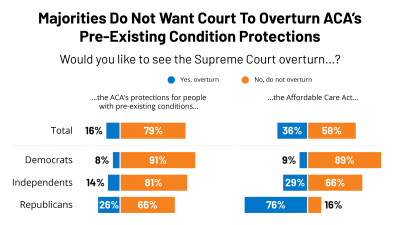 KFF Health Tracking Poll – October 2020: The Future of the ACA and Biden’s Advantage On Health Care
Report
KFF Health Tracking Poll – October 2020: The Future of the ACA and Biden’s Advantage On Health Care
Report
The poll examines the public’s views on the Supreme Court case to overturn the Affordable Care Act and its protections for people with pre-existing conditions. Less than a month from the results of the 2020 presidential election, this poll examines the top issues for voters (the economy, the coronavirus pandemic, health care, criminal justice and policing, among others) as well as which candidate, Biden or Trump, they think has the better approach to handle key health care policy areas.